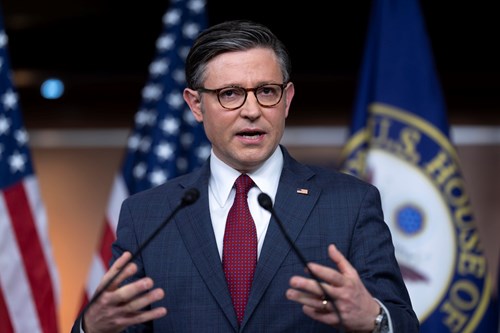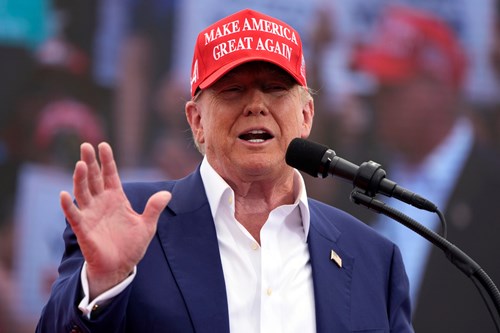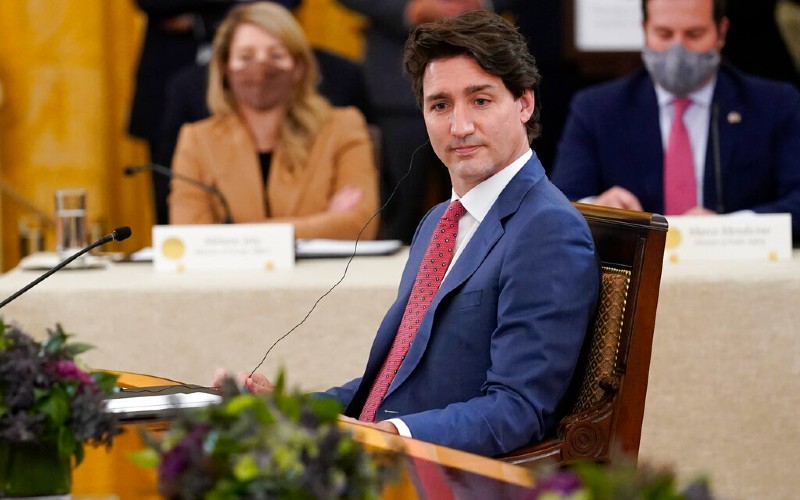The Safeguard American Voter Eligibility Act, introduced by Rep. Chip Roy (R-Texas) in the spring, would basically require election officials to enforce existing citizenship requirement laws that some currently ignore.
Voter registration forms ask if hopeful registrants are a U.S. citizen, but often their answers go unverified.
Aware of that slippery allowance, the SAVE Act would require states to validate a voter’s citizenship status with a current passport, military ID, or other acceptable documentation.
 House Speaker Mike Johnson attached the SAVE Act to a continuing resolution, or CR, that would have funded the government through the election. The government will cease most operations when the current funding agreement expires at midnight on Sept. 30.
House Speaker Mike Johnson attached the SAVE Act to a continuing resolution, or CR, that would have funded the government through the election. The government will cease most operations when the current funding agreement expires at midnight on Sept. 30.
The attempt failed Wednesday by a vote of 220-202, with 14 of Capitol Hill's most fiscally conservative Republicans voting against it. Three Democrats voted in favor of the SAVE Act CR.
The concern by most Republicans now is that the House will pass a short-term CR that will necessitate rushed passage of a larger spending bill bloated with Democrats’ pet projects – an omnibus – before the end of the year.
A new spending agreement of that nature would almost certainly make it harder for Donald Trump, if elected president, to quickly move on many of his initiatives.
“Democrats want to jam us to at the end of the year to put a quick package in a big, huge bill with all their woke policies and all the different wish list items that they have for a progressive agenda,” Rep. Greg Murphy (R-North Carolina) said on Washington Watch Thursday.”
Mills: not fighting hard enough
Rep. Cory Mills (R-Florida), writing on X, said he voted against Johnson’s CR effort, calling it a “bloated inflationary nightmare which will NOT result in the SAVE Act being passed in the Senate.”
Mills dug in his heels and encouraged a government shutdown, noting the Senate’s refusal to pass HR2, the House’s effort to secure the border.
Mills thinks a shutdown could force the Senate’s hand not only on the SAVE Act but on HR2 as well.

“I don’t think we have fought hard enough to do what’s necessary in order for us toe secure the border. We’ve been messaging for 20 months on HR2, but we’ve not attached that to a single CR or funding bill. If we didn’t do it for HR2, but are we attaching the SAVE Act at the last minute? We should refuse to fund government until the Senate takes up HR2 and the SAVE Act,” he wrote.
He continued, “Use that power of the purse we call clamor about but fail to use. No more DC status quo.”
Murphy told show host Tony Perkins that getting business done requires more tact than Mills is showing.
“We can’t do this if we’re not smart enough, or not strategic enough, to understand we have to beat the Democrats at their own game,” he said.
 “We have to be strategic about this, and this is where I get a little frustrated sometimes with some of my colleagues with not being strategic about it," the lawmaker continued. "I'm not a fan of CRs. I don't believe that's any way for our military to predict or do anything of that nature, but I think if we can push into March, hopefully President Trump gets elected, and we can actually get back to some real true fiscal policies.”
“We have to be strategic about this, and this is where I get a little frustrated sometimes with some of my colleagues with not being strategic about it," the lawmaker continued. "I'm not a fan of CRs. I don't believe that's any way for our military to predict or do anything of that nature, but I think if we can push into March, hopefully President Trump gets elected, and we can actually get back to some real true fiscal policies.”
That’s not the kind of strategy Trump is employing, however. He sided with Mills’ approach in a Truth Social post ahead of the vote, calling for passage of the SAVE Act with no strings attached.
“If Republicans don’t get the SAVE Act, and every ounce of it, they should not agree to a Continuing Resolution in any way, shape or form,” Trump wrote. “Democrats are registering illegal voters by the TENS OF THOUSANDS as we speak. They will be voting in the 2024 Presidential Election, and they shouldn’t be allowed to.”
 Johnson saw trouble for the SAVE Act CR a week ago as he discussed the need for Republicans to “build consensus.” With that in mind he delayed bringing the measure to the floor for a vote.
Johnson saw trouble for the SAVE Act CR a week ago as he discussed the need for Republicans to “build consensus.” With that in mind he delayed bringing the measure to the floor for a vote.
Hard-line party members with raging government debt in mind are prioritizing spending ahead of the SAVE Act.
Rep. Thomas Massie (R-Kentucky) called Johnson’s effort “unserious because we’re cramming all government spending into one bill instead of deciding what to spend it on. We’re saying, ‘let’s just spend at least as much as we spent last year and not worry about any of these bills through committee or debating how much we should spend on those things,” he said from the House floor Wednesday prior to the vote.







